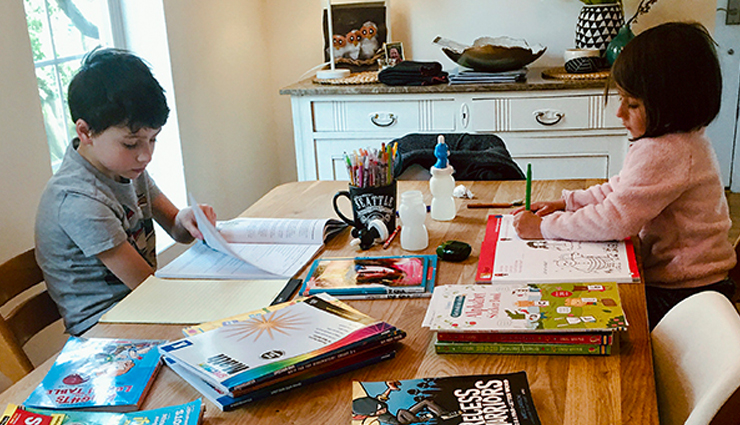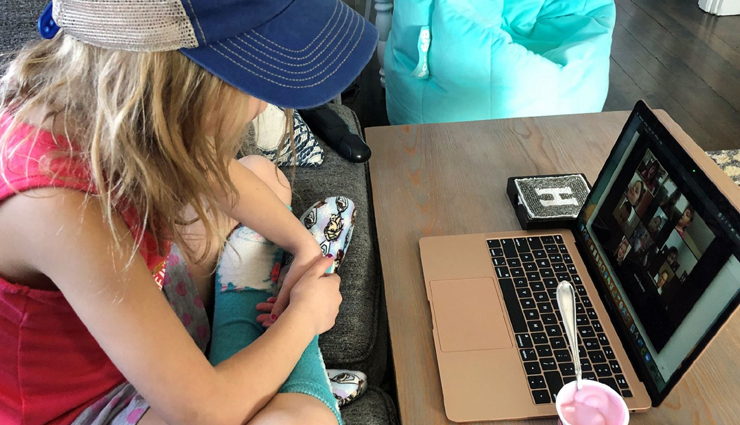- Home›
- Mates & Me›
- Why Your Child Gives You Such A Hard Time And Ways To Cope Up With Remote Learning
Why Your Child Gives You Such A Hard Time And Ways To Cope Up With Remote Learning
By: Varsha Tue, 29 Sept 2020 12:48:06

Much like bars, restaurants, gyms and office buildings, schools are reopening across the country. However, different school districts, cities and states have adopted a variety of school models ranging from fully in-person to fully remote. On top of dealing with the economic stress and emotional anxiety of the ongoing pandemic, parents or guardians of children who are still doing part or all of their school days remotely are trying to find ways to support their kids’ education. We spoke with teachers who specialize in different grades and subjects across the country to get these instructional tips that parents can use to help their students succeed this school year.
1.Mirror their in-person school routine
No matter the school model your school, district or city is using, teachers advise that a student’s day at home should mirror their in-school schedule and routine. Parents should encourage their children to adhere to the same schedule in remote mode as if they were going to school in-person, meaning getting out of bed at a similar time, getting dressed and taking their lunch break.
2.Be a role model
Practicing healthy habits yourself can help encourage your children to do the same. Even if you’re working from home, you should also get dressed in the morning, take breaks, maintain a regular bedtime, get plenty of sleep and exercise and eat well.

3. Set a positive tone
Be excited for them to ‘sign on’ or head into school if they’re doing a hybrid approach. This time is crucial as we have a chance to show children the importance of working together, being respectful, building connections and putting an emphasis on learning. We are all truly in this together.
4. Create an effective learning environment
Teachers know how crucial having a proper learning environment is in their classrooms, and parents can help their kids have a solid setup at home as well. Set up an area at a comfortable desk or table to work from with minimal distractions and all the materials they’ll need throughout the day, such as pencils, paper and calculators as well as water and snacks. Some kids need peace and quiet to work efficiently and maintain focus, while others might need music playing or something to do with their hands.
5.Take brain breaks
These “brain breaks” can also be used as an incentive for students to stay on task and accomplish goals throughout the day. “I suggest having something motivating upon completion of work or activities,” “It can be outside time, a favorite TV show, a board game or time on their device. … You know your child best so you’ll know what can be used for motivation to complete assignments and be present for set learning times.
6.Accept there will be trial and error
Many teachers spend years or decades figuring out what classroom setups and structures work best for them to teach and their students to learn. Finding out what your child needs throughout the day to focus and stay motivated at home will take some time and trial and error.
7.Incorporate art and music into their day
Many parents might focus on their child’s progress in spelling or math, but forget to focus on other activites in their routine.

8.Accept there will be trial and error
Many teachers spend years or decades out what classroom setups and structures work best for them to teach and their students to learn. Finding out what your child needs throughout the day to focus and stay motivated at home will take some time and trial and error.
9.Incorporate art and music into their day
Many parents might focus on their child’s progress in spelling or math, but it’s important for children to spend time working in the “special area subjects” of school such as music and music.
10.Get them active
Much like how art and music can facilitate learning and inspire creativity, exercise and physical activity is also key to helping students thrive. “Physical education can be an outlet for students to heal through movement.
.
11.Work as a team with teachers
Despite the distance and stressful circumstances, teachers need their students’ families to work in partnership with them. “Teachers are supposed to educate your children, but parents are supposed to support and enforce learning at home as well,” . “Please be open and support your student and their teacher by being engaged in your child's learning as much as you can.
12.Communicate with teachers
If you feel like your child is struggling with schoolwork or remote learning, don’t immediately turn to Google or a blog for solutions — the first person you should reach out to for help is their teacher. Email and phone calls are an option, but many teachers also have digital “office hours” where parents can drop in via Zoom or another video platform to meet with the teacher.

13.Give positive feedback too
Parents and teachers shouldn’t only communicate when there’s a problem. Teachers also want to know when something they’re doing is working well or students are responding well to certain lessons.
14.Be patient
While parents have more ways than ever to communicate with school staff, it’s important to be patient when working with teachers as well as with your child.
15.Make learning a family activity
A way to get your student moving and to help some of the concepts and information they’re learning stick is to turn learning into a family activity. Walking nature hunts, at-home science experiments, acting out historic events, putting on a play or family read-alouds are all teacher suggestions for helping make at-home learning more interactive and fun.
16.Ask them about what they’re learning
Even something as simple as asking your kids about what they’re learning while enjoying a family dinner can make concepts more interactive. “I often try to get [my own kids] to explain a topic or what they are learning to me to help them build a better and deeper understanding of it,” Devins said. “That is something that can be done at any age.
17. Go to the library
Another aspect of a typical school day you can recreate at home for your children is going to the library.

18.Encourage social interaction
While cutting down on distractions can help keep students focused, having time to chat and socialize is an important part of the school day too. Students doing remote learning lose time to play with classmates or catch up in the hallways, at lunch or during free time. Parents can encourage their children to find opportunities to connect with their classmates during “brain breaks” throughout the day, during lunch or before or after school hours.
19.Turn your child’s camera on
One way to make sure your child is engaged and to help their teachers better connect with them is to make sure they have a working web camera and keep it on during class. “If there is a reason why your student won't turn their camera on, please let their teacher know,” said Julia Davidson, an English teacher at Lincoln Park High School in Chicago. “It is nearly impossible to build a classroom community when you can't see and talk to each other — so we need those cameras on, whenever possible.
20.Create a ‘pandemic pod
Parents across the country have turned to the concept of “pandemic pods” to help their children get extra supervision, learning support, socialization and more while doing remote learning. These pods can be as simple as a small study group with your child and other students in their class or other kids from your family or neighborhood. This community group can provide vital socialization and emotional and learning support during remote learning.
21.Show your appreciation
While the teachers we spoke with would never ask for any thanks or rewards for doing their jobs, many teachers are going above and beyond during the pandemic. If you’re looking to show your appreciation for your child’s teachers, there are plenty of fun, creative ways you and your child can say “thank you.”
22.Emotionally check in on your child
The coronavirus pandemic has taken a physical and emotional toll on adults and children alike. Your child’s mental health is a crucial component of them being able to learn. Many students might be feeling frustrated, depressed or anxious because school still looks and feels different than “normal.” Have open conversations with your children, reassure them and use some of these techniques for managing stress during the coronavirus pandemic.





